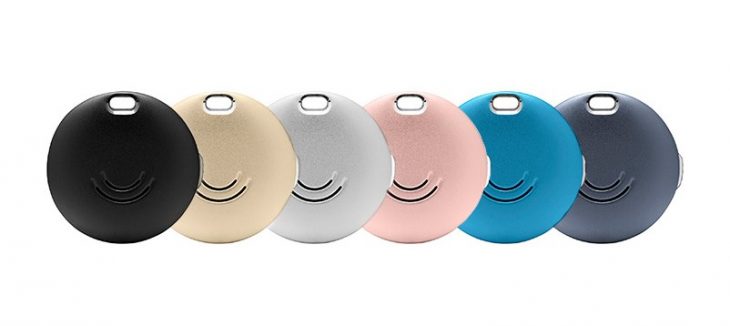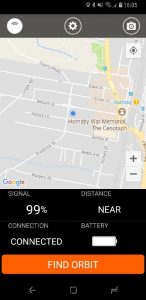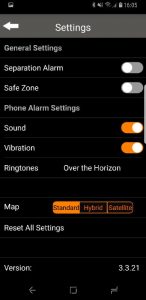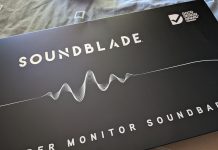
For the last few days I’ve been trying out a new key finder from a Sydney based company called HButler. Called the Orbit — which is appropriate for a round keyfob — this small, chubby disc fits on your keyring (or basically anything else you care to attach it to) and lets you find your stuff using your smartphone. At least, that’s the premise.
What’s Orbit?
We’ve seen a few key trackers in recent times, leveraging the power of Bluetooth connections, so the idea isn’t exactly new. Some use crowd-sourced GPS to find things that you misplace in public — with mixed results — and others, like Orbit, rely purely on your phone (which it’s assumed will be on you wherever you take your Orbit).
Plus side, the service offering is quite a bit more simple, but the downside is if you lose your stuff without having your phone on you, you won’t know where you were when Orbit last pinged, and no one else (assuming they’ve even got the Orbit app installed) will be able to locate your stuff, either.
The last keytracker I used was Trackr, which we picked up at Mobile World Congress earlier this year, and compared to that, Orbit is both a bit larger and a bit fatter. Trackr is closer to the size of a $1 coin, and Orbit is a bit larger, and probably 4-5mm thick or so.
It has a few unique selling points; it has a premium aluminium casing, it offers a level of water resistance, a replaceable, CR2025 battery, and it comes in a range of colours to suit your keys, bags, or other things.
Trackr is about the same price, also offers a replaceable battery, but the colour range is less, and its water resistance is doubtful at best, though you can get a waterproof cover for it.
How’s it work?
It’s a keytracker, and it mostly does what it advertises. The functions are pretty simple once it’s set up:
- You can ring the Orbit from your phone, if you lose your keys
- You can ring your phone from the orbit, if you lose your phone
- You can use Orbit to take a selfie, provided you turn that mode on in the Orbit app
It’s about that simple.
We’ve seen reports on Orbit’s app listing that the connection between your phone and Orbit can be a bit hit and miss, and we’ve seen that ourselves. The review unit lost its connection very quickly after I walked away from it, and nothing would bring it back. However, changing the battery (even though the first battery wasn’t flat) seemed to bring it back to life, and since then, it’s worked consistently.
If you walk too far away from Orbit, it loses connection (and you can set the app to buzz if you do so), but within a few seconds of it coming back into range, it reconnects and everything’s hunky dory.
I can’t help but worry that, somehow, the battery might randomly die and my lost keys would stay lost, but that’s — frankly — a worry with any keyfinder, whether it be this one or anyone else’s. Once the battery’s dead, it’s dead Jim.
Would you buy one?
At $39.95 ea, it’s not exactly what I’d call cheap, but these things generally aren’t. Trackr is $29.95 US (and once you factor in getting it to Australia, $39.95 sounds good), and the other brand frequently found in Australia — Tile — is priced at $39.95 to start with as well.
Orbit need not just be a keyfinder though; you can get different variants designed for different things. For example, Orbit Card is a slim credit-card sized tracker which slips into your wallet, and there’s other models designed for your Glasses, or anything else you can stick a small disk to (such as your TV remotes).
For those who want something a bit more fancy, there’s the Orbit Wallet, which pairs genuine leather, a built-in 2,500 mAh power bank, RFID blocking for your sensitive cards, and compatibility with Orbit to find the special wallet if you happen to lose it. Sadly for Android users, it comes with Lightning and MicroUSB adaptors, not USB-C, so your more modern phones can’t be powered without an adaptor.
We quite like the idea of the Orbit Wallet, though the power bank does add a bit of thickness before you put any cards in. However, if you find your phone running down during the day, and you only carry a couple of cards and a bit of cash (no coins), Orbit Wallet is a great solution (albeit a bit pricey at $149.95).
The best bit? HButler, the company behind Orbit, is entirely based in Australia, and so by buying Orbit, you’re supporting a couple of Sydney-based entrepeneurs. That’s a good enough reason in my book to at least consider their product range.
You can buy Orbit gear online starting at $39.95 for Orbit Keyfinder, $149.95 for the Orbit Wallet.







“You can ring your phone from the orbit, if you lose your phone”
What happens if the phone is on mute? Will it still ring?
Yes Tom it will ring at full volume. You can’t miss it.
Hi Chris, Thanks for the review. Sujay, I see your question about Bluetooth range. Anything within that 30m/100ft bluetooth radius, you will be able to ring using either your phone or your Orbit. Once you disconnect from that 30m/100ft bluetooth connection, with Orbit’s free-app, the map will show you the last known GPS location where your Orbit was seen. Two features not mentioned in the review, and not included with our competitors products, is the ’Separation Alarm’ and the ’Safe Zone’. The separation alarm can be set up so that if you walk out of the 30m/100ft radius, from either… Read more »
I have just received my Trackr after reading about it on Ausdroid. I understand that whilst the Trackr and my phone are within Bluetooth range of each other, I can find the Trackr. However, what happens if the Trackr and my phone are not within Bluetooth range? And the reason I am making this comment on this article is because that question hold true for Orbit as well. Can I use my phone/computer to find my Trackr/Orbit similar to finding my phone?
Ok so to unpack this a bit. If your Trackr is out of Bluetooth range, it sits dormant unless another Trackr user walks by. Their app -should- ping the device and send its approximate location to the Trackr cloud, allowing you to find your missing stuff. However, it doesn’t ping constantly; the user would need to be near your Trackr for a few moments in order to recognise it. For Trackr, at least, you can use your phone to find your missing Trackr. I don’t believe there is a web app. Harmony has jumped on with answers to the Orbit… Read more »